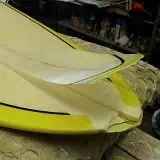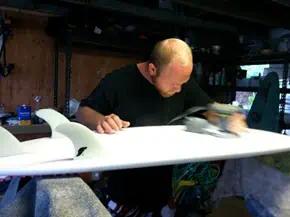A surfboard repair technician is responsible for repairing, maintaining or improving surfboards belonging to his or her customers.
People who enjoy surfing tend to find the sport takes a seasonal toll on their equipment. As well as impact damage from rocks and flotsam, many surfboards sustain damage whilst being transported to and from the beach. Small impact marks (“dings”) are very common but must be repaired quickly to avoid further damage to the board. The surfboard is also susceptible to picking up cosmetic damage, so in either case, the surfer must find someone who is capable of carrying out an effective repair. Many surf shops have their own technician to complete customer repairs from within the retail store.
Surfboards are constructed either from epoxy or polyester resin. The type of construction depends on the climate where the user lives, and repair techniques are specific to each construction. It is crucial the repair tech is able to understand board construction in order to not make the surfboard’s condition worse. The mixing of resin to the appropriate ratios requires skill and experience. Most technicians are avid surfers anyway, but some prior knowledge is essential in carrying out this work. A full joint repair to a completely “totalled” board is a complex procedure requiring knowledge of sanding, filling, jointing and finishing.
Salary
It is rare for a surfboard technician to work full-time hours, although some are able to do so overseas. In the UK, the job is remunerated hourly, and it is unlikely the candidate will earn more than statutory minimum wage. This is currently £5.93 per hour for workers aged 21 and over, £4.92 for those in the 18-20 age category, and £3.64 for young workers aged between 16-17 (source: DirectGov UK).
The work is also seasonal as it is impossible to surf all year round, except in certain locations which are famed as surf meccas. In the UK, the surf season runs from autumn to spring, and conditions vary depending on the location. Mid-autumn is known among surfers to be the best time, and this is usually the time when the shops are most busy.
Responsibilities
- Repair and maintain customers’ surfboards
- Advise the customer on ways in which they can best utilise their equipment for a given location
- Carry out modifications, including some improvised repair techniques
- Complete cosmetic modifications in line with customer’s request
- Assist with store retail operations when time allows
- Actively promote the surf shop within the local surfing community for the good of the business
Qualifications
Whilst definitely a technical role, many of the repair skills required to work in surfboard repair are learned either on the job or in training prior to commencement of the role. For this reason, there are no formal academic requirements placed upon new candidates. It is not necessary that the candidate complete additional training outside the business either. In fact, many techs take advantage of the seasonal nature of the job and work around commitments to their own college courses, enabling them to support their study for other careers.
Skills
- Candidates must have a passion for surfing and a desire to help other surfers
- It is crucial the tech has an understanding of differences in surfboard construction
- Must have a complete grasp of repair techniques necessary in carrying out a “board fix”
- Artistic skills are required for surf techs who wish to offer cosmetic improvements to customers’ boards.
- Must be flexible with regards hours and be prepared to work evenings and weekends when required
Working Conditions
Although technical in nature, the surf shop does not tend to place candidates in particularly hazardous working conditions; this would class as a medium-risk environment. However, candidates should be aware that they will be working with industrial-strength resins, electric sanders, drills, and fibreglass dust and, in addition, the job does involve some moderate lifting, so care and common sense is called for. The manager of the surfing store should provide a walk-through of all of the equipment in the shop, and make the candidate familiar with areas of particular risk. Protective eyewear and breathing protection should be worn when working with the sanding equipment. The tech must be aware of what others are doing in the workshop, and also make sure their actions do not place co-workers at risk.
Experience
Most surf techs begin working in this field because they enjoy surfing and want to earn some extra money to augment a full-time income. Often, technicians will begin to learn the skills necessary by completing simple repairs on their own equipment, and then attempting more involved repairs for themselves or others. A completely broken surfboard (“the snap”) is an involved and difficult problem to correct; it requires a wealth of previous experience gained in more simple repairs such as “shatters” and “fractures” (damage to the core and finish).
Career Progression
As most surfing shops have a small number of staff and are effectively not trading for several months of the year, the chance of progression is quite limited. Some surf techs explore the opportunities offered to skilled surfboard repairers overseas; this can yield some amazing adventures and the chance to explore some beautiful places. It should be noted, however, that these positions will not offer a big salary or the chance for career improvement. Often, working in a surfing shop is a means to an end; either it provides a basic living allowance whilst the candidate is studying, or it affords them the chance to travel.
Employers
In the UK, many surf repair shops are concentrated in the South West of England, as this is the hot-bed of surfing activity in the country. The best surfing beaches are reputed to be Gwithian (St. Ives, Cornwall), Watergate Bay (Newquay), and Caswell Bay (Swansea, Wales), and have naturally attracted a concentration of surfing shops in these locations.
Image

Also known as…
- Board tech
- Surf tech
Related Jobs
- Ski and Snowboard Technician
- Adventure sports organiser
What’s it really like?
Chris Storey is a highly experienced surfboard repair technician at Hotpipe Surfboard Repairs, a very busy repair shop at Shoreham Beach, UK, which handles a complete range of surfboard repairs.
Can you explain about the different elements of the job?
We basically carry out a full range of repairs, and we offer three service levels to our customers: gold, silver and bronze. Bronze repairs are designed to get the surfer back in the water as cheaply as possible, and a lot of guys like to show off their “war wounds.” We understand this point of view completely. The silver service is basically the same repair but with cosmetic coverings such as a decal or paint to hide the damage beneath. This suits surfers who are happy to reinvest in their boards and preserve the look of them. The gold service is close to being an invisible repair and is very labour-intensive. I cannot always make it perfect, but with this repair, I spend a lot of time in making sure it looks as good as it can possibly be.
What made you decide or choose to get into this sort of career?
To be honest, working as a surfboard technician is not really a career. You can’t make enough to live off, but it’s a good second source of income. It especially suits you if you’re a surfer, because you work in regular contact with people who love the lifestyle, and this job allows you to help other people enjoy it too.
Do you have a standard day or a standard type of `exercise’?
Most repairs fall into one of several categories. The most common are surface dings. Next up you have damage to the shell or core, and then beyond that, I complete full repairs to boards which have snapped into two pieces. These are obviously the most complex to put right.
What do you like most about the job?
The fact I get to help out other surfers and work within an industry I love.
What do you like least about the job?
I’m not a miracle worker, and repairs are not always 100% perfect. Some of the guys who come to me need to understand there is only so much you can do. Also, if you want a job that gives you more time to surf then don’t start a repair shop! You spend more time keeping everyone else in the water rather than surfing yourself!
What are the key responsibilities?
Carrying out repairs and advising the customer on how to get the best from their equipment depending on where they are going to be surfing. The type of resin you use depends on where the customer will be surfing, so you need to have experience in this respect.
What advice do you have for someone who is looking to get into this as a career?
Just to treat it as a second job if you plan on working in someone else’s store. Depending on the time of year, there is a lot of work available. Our shop is absolutely stacked right now, plus I’m trying to fit everything around my college exams!










